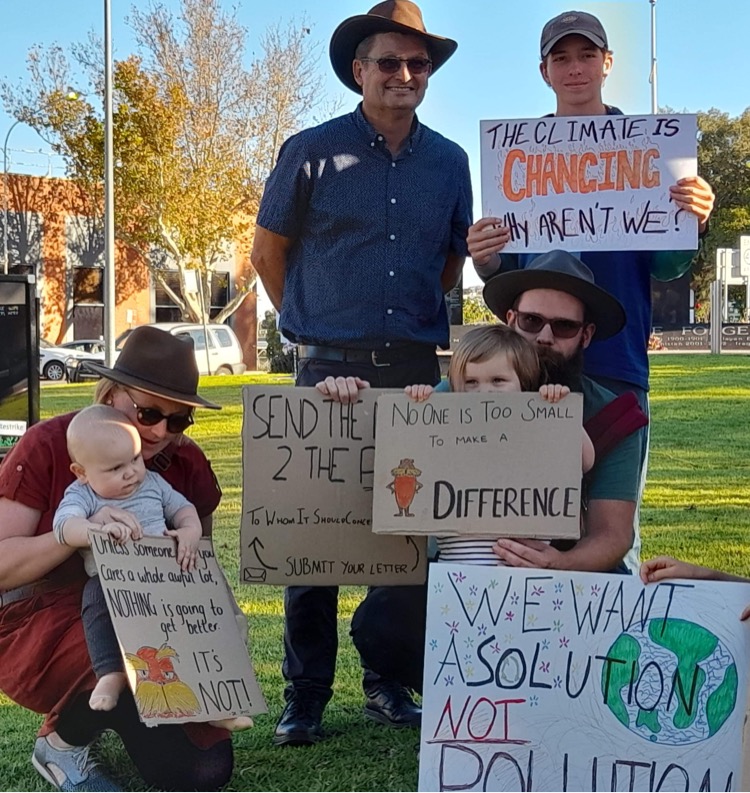In 2019 our Synod resolved, as part of a Climate Action Strategy, to stand with young people in their advocacy on climate change through the School Strike 4 Climate movement.
Their birth years might be more than 44 years apart, but Elizabeth (Libby) Hoyle and Neil Westcott have more important things in common than their age.
For starters, they are both long-time residents of the Parkes region in the central west of NSW. Libby has lived all her 17 years in the town itself, while Neil has farmed for more than 40 years in nearby Alectown.
In addition, Libby and Neil and their families are all members of the Welcome congregation of Parkes Uniting Church. Neil’s involvement spans decades and still includes leading the music group most Sundays, while all Libby’s formative years, along with her family, have been lived as part of that faith community.
But more than those connections, they share two important commitments. They each, via different paths, have come to care deeply about the issue of global warming and climate change, and they both support young people in the School Strike 4 Climate (SS4C) movement. Last month they joined forces in the Parkes School Strike 4 Climate event, Libby as the chief organiser and Neil as a main speaker.
Libby can’t remember a time when climate change was not an issue or a present reality in her life. She was born during the Millennium drought. Her mum, Arlene Cassel, told her it didn’t rain until she was three, and Libby was quite startled when it did. As she grew up, she became used to droughts and bushfires with their choking air and orange skies. She also became used to being anxious about global warming and, maybe worse, national leaders who, she said regretfully, “treated climate policy like a political football”.

Strangely enough, it was the pandemic that was the last straw. She recounted how in 2020, she just felt sick, not from COVID, but from the sense of helplessness it evoked. She couldn’t do much about Coronavirus, but she could do something about climate change. So, she got in contact with the School Strike 4 Climate movement and, as a result, took on the role of organising Parkes first-ever SS4C event.
It made sense for Libby, when looking for speakers, to turn to family friends and fellow church members the Westcotts. Neil was not just a community member, local councillor and farmer, but also a member of Farmers for Climate Action and convinced of the need for a strong response to address global warming.
Neil is a fifth-generation farmer who has been growing canola, wheat and barley on the family’s Alectown property for over forty years. As a farmer, he believes he has no greater responsibility than to be a good steward of the land he cares for. That is one reason he agreed to speak at the Parkes School Strike 4 Climate event. But the decision also grew out of his great frustration at the lack of urgency in addressing the unfolding climate crisis and what he sees as,“total disrespect for science and empathy for future generations.”
For Neil, the impacts of global warming and the scientific evidence that underscores them are abundantly clear.

Neil shares with Libby a strong dislike for the politicisation of action on global warming, and he speaks candidly about it. “I am a farmer’s son who has been a conservative voter all my life…..But this is a war and the spin doctors need to get out of the room.” He expresses disappointment and anger at what he sees as a lack of leadership by his industry and the government to the threat of climate change. Neither Libby nor Neil see global warming as a party-political issue, but a human issue, a problem we have to solve together. “It’s going to take all of us” Libby says, “individuals, businesses and governments.”
Libby was pleased with how Parkes’ first School Strike 4 Climate event went. Despite the cold afternoon, about 80 people gathered in the town’s Cooke Park. There were four speakers, Neil and Libby, year four student and co-organiser Oscar Hendry and Wiradjuri student Iesha Thompson, who gave the Welcome to Country. The local papers provided good coverage, both before and after the event, with Libby and Neil widely and accurately quoted. And importantly, some good conversations resulted within the church congregation and the wider community. That’s what Libby had really been aiming to do, to get those conversations and honest discussions happening.
They also copped some flack through social media and other channels. Not surprising really Neil reflected, in a community with a diversity of strong views and where media outlets quite hostile to even talking about global warming get a fairly high rating. Fronting up and nailing your colours to the mast in a town where most people know you, or your family does take some nerve. There’s no sign though that either Libby or Neil have been deterred. In fact, the opposite is true. Libby says that being involved in the SS4C movement, experiencing the support she received and seeing the interest in the community about the event, has given her hope.
And the stakes are too high to stop. Both Libby and Neil are conscious that the world’s carbon emissions are still rising and time is running out. “2020 offers us one last chance to avoid the worst of climate change”, says Libby. And with disarming honesty she adds, “I have to believe that actions like this can make a difference.” Neil is equally resolved. “We have to accept the science and that there’s just one little planet called Earth, he said. There’s no plan B so we need to do what it takes.”
Jon O’Brien
Social Justice Advocate, Uniting












